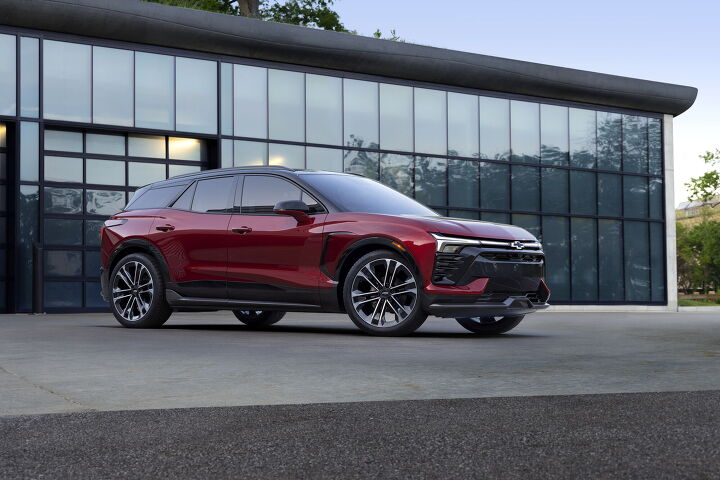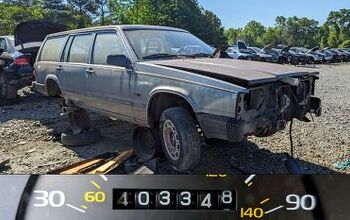The New Chevy Blazer EV Has Stumbled Twice in Recent Tests - Hard

General Motors’ fortunes are tied heavily to its new Ultium EV technology. It underpins several existing and upcoming models and is the basis of the automaker’s EV efforts, costing billions of dollars and years of development. A few Ultium-based models have already gone on sale without too many issues, including the GMC Hummer EV and Cadillac Lyriq, but the most recent release hasn’t gone so smoothly. The Chevrolet Blazer EV has recently failed in two high-profile tests by automotive publications, raising questions about its electrical system and software.
Kevin Williams at InsideEVs experienced several issues on his road trip from Ohio to North Carolina, leaving him stranded at a rural charging station. Now, Edmunds is reporting a similar experience, with its almost-new long-term Blazer EV test vehicle recording dozens of errors and weeks in the dealer repair department.
While Williams’ road trip ended with a stranded journalist and a vehicle that couldn’t complete its intended journey, Edmunds’ at least ended in its home area in Southern California. The publication saw eight warning lights during its trip between Los Angeles and San Diego.
Unlike Williams, Edmunds got a 12-volt system error, but both experienced issues charging. Both experiences also unraveled over a short period, but Edmunds recorded 23 issues requiring fixes. The publication sent its SUV to the dealer, where it’s been for more than two weeks so far, requiring support from a GM technician and surrounding stores.
The list of faults is long and won’t be all that interesting for many readers, but there are a few issues to address. The body and drive motor control modules malfunctioned, leaving “lost communication” messages with some windows, while the head-up display experienced a “general electrical malfunction.”
To be fair, this is not only a brand-new vehicle but a brand-new vehicle in a somewhat untested format for GM. People often advise against buying first-generation mobile phones and electronic devices because of the complexity involved with developing an all-new product, so, hopefully, General Motors and Chevy can address these issues with an over-the-air software update to smooth the landing a bit.
[Image: Chevrolet]
Become a TTAC insider. Get the latest news, features, TTAC takes, and everything else that gets to the truth about cars first by subscribing to our newsletter.

Chris grew up in, under, and around cars, but took the long way around to becoming an automotive writer. After a career in technology consulting and a trip through business school, Chris began writing about the automotive industry as a way to reconnect with his passion and get behind the wheel of a new car every week. He focuses on taking complex industry stories and making them digestible by any reader. Just don’t expect him to stay away from high-mileage Porsches.
More by Chris Teague
Latest Car Reviews
Read moreLatest Product Reviews
Read moreRecent Comments
- Redapple2 All this BEV investment. A bigger impact (less oil consumption) would have been made if we had made PIG UP trucks smaller since 2000 and not HUGEr. (And raised gas tax by $2-3/gallon.)
- ChristianWimmer One of my clients is a company that is actually producing eFuels in Leipzig. Yes, they require a lot of energy to produce but this would not be an issue if Germany had nuclear energy or used the excess energy from wind and solar to produce these fuels. In such a scenario the energy losses wouldn’t really matter.Also, I am told that nations like Spain or the North African nations like Morocco or Tunisia could be ideal places to produce eFuels/Hydrogen due to their abundance of solar power. Again, the energy loses here would not matter since the energy used to produce these fuels is essentially “free”. If this path were pursued, Morocco and Tunisia could become wealthy nations and exporters of eFuels and Hydrogen. Countries with an abundance of solar or wind or hydro energy could be producing eFuels for their domestic consumption and export.Another argument which to me is irrelevant these days ist the poor thermal efficiency of ICE engines (25-35% gasoline, 40-45% diesel). One long trips with cruise control set to 130 km/h and even the occasional venture into the 180-200 km/h zone, my fully loaded (with my gear) A250 (2.0 4-cylinder 224-hp Turbo) can achieve an impressive gas mileage of 6 L / 100 km. That’s phenomenal - I am looking at six 1 liter bottles of water right now and that’s all my car needs to travel 100 km… amazing.So, I am a supporter of eFuels. I love internal combustion engines and if we want to use them in a climate neural way, then eFuels are a must. Also, to me every ICE car is way more sustainable and longer-lasting an an EV. Mazda, Toyota etc. are making the right move IMO.
- Blueice Once you infuse governmental unit regulation & [marketing] and taxpayerfunding, one knows quite well, dat the product or service isdestine to fail; which includes battery vehicles. Just axe yourself how revolutionary have your home batterydevices become ??? I am still waiting. after three decades, for a battery shaver whichonly requires charging two or three times per year.I am glad that I do not have a plug in Frau.
- Tassos Such a heavy breadvan on stilts, with so much HP, AND with ONLY 100 KWH Battery, I doubt if you will ever see 250 miles, let alone 300, under the best of conditions. In the winter, count on 150 miles range.And NO, it looks TERRIBLE. The only SUV that looks great is the RANGE ROVER.
- Tassos They sure are doing the right thing in the SHORT and MEDIUM term.As for the long term, in the long run, YOU'LL ALL BE DEAD, so WHO CARES.


































Comments
Join the conversation
This is just in. GM is delaying the Blazer EV due to software issues. We probably won't see the Blazer EV in showrooms until the spring. GM is making Tesla look like Toyota when it comes to reliability. Toyota is getting the last laugh at GM's expense.
Read the new release below.
https://www.msn.com/en-us/autos/news/gm-stops-selling-the-chevy-blazer-ev-to-deal-with-software-quality-issues/ar-AA1lWUOK
Nice looking car, too bad. They should have held it back longer and worked all the bugs out. It looks so good I would actually consider one, but...